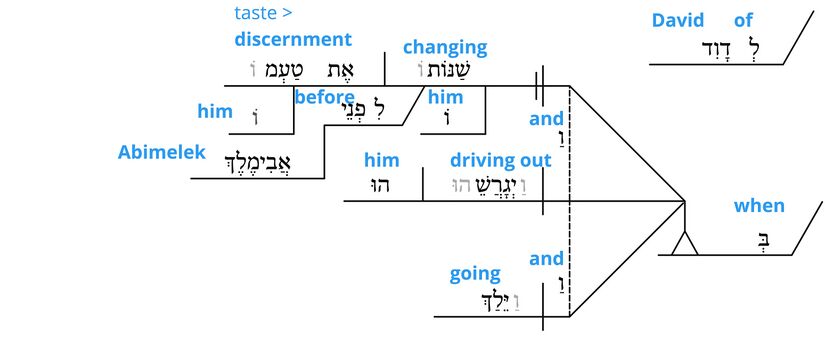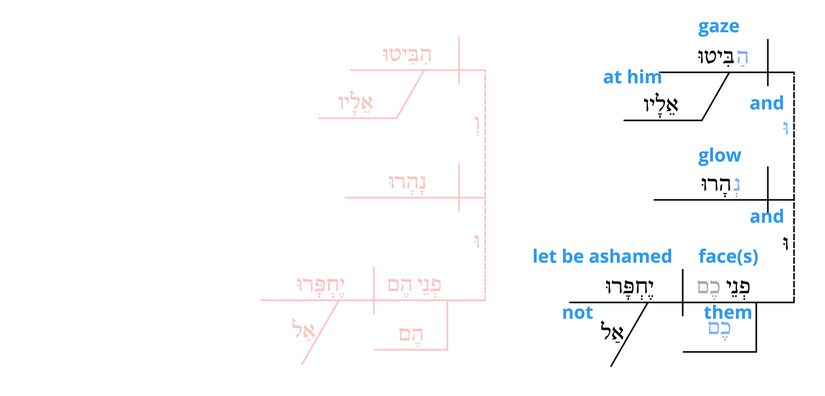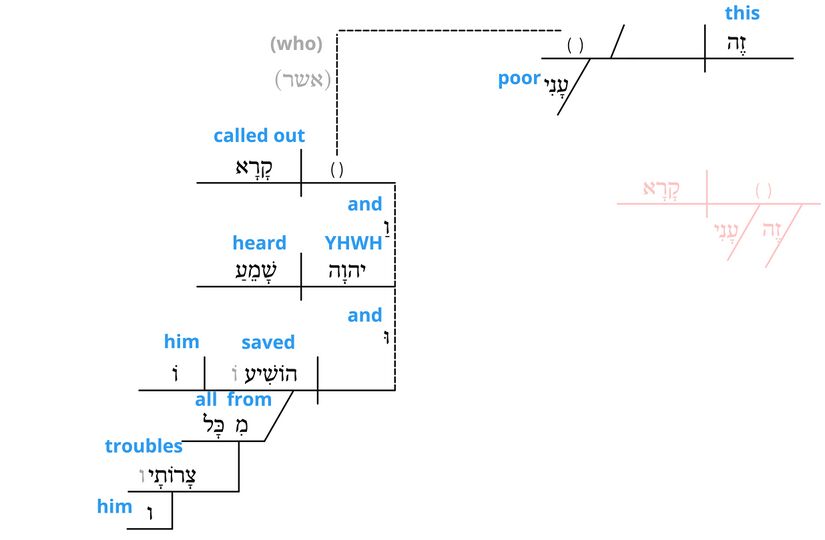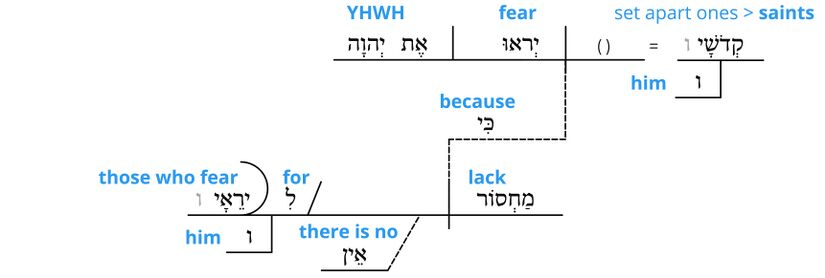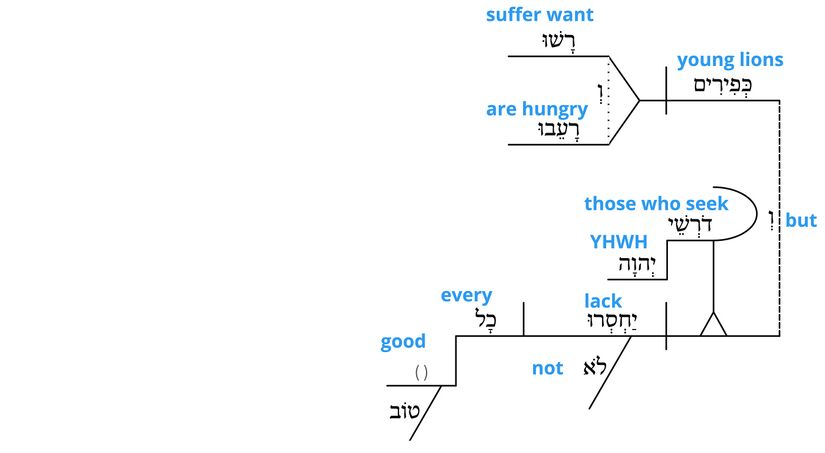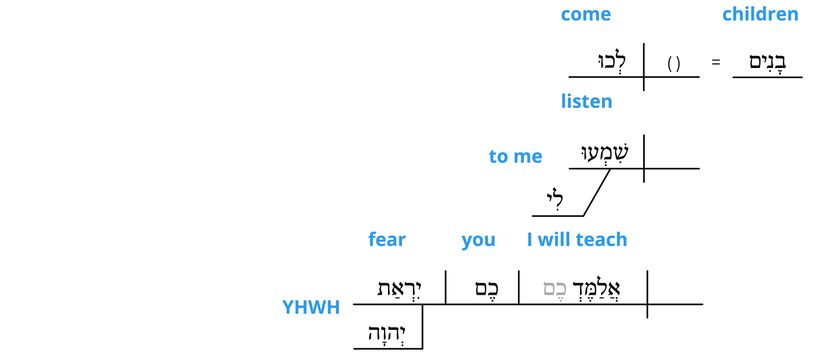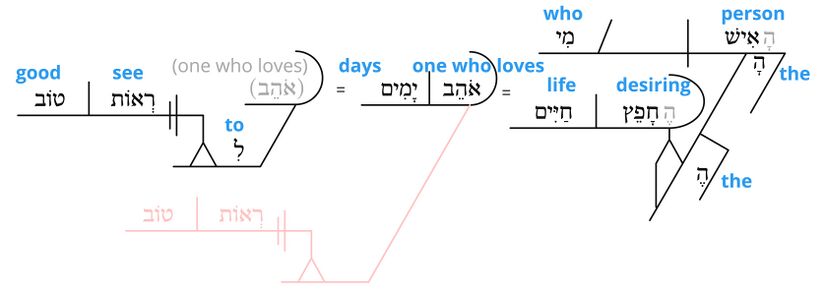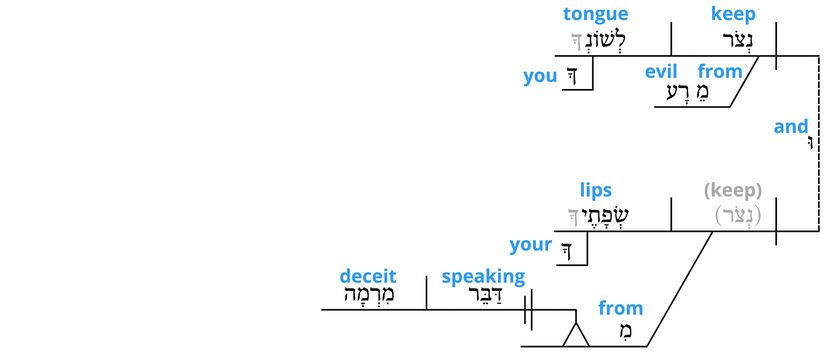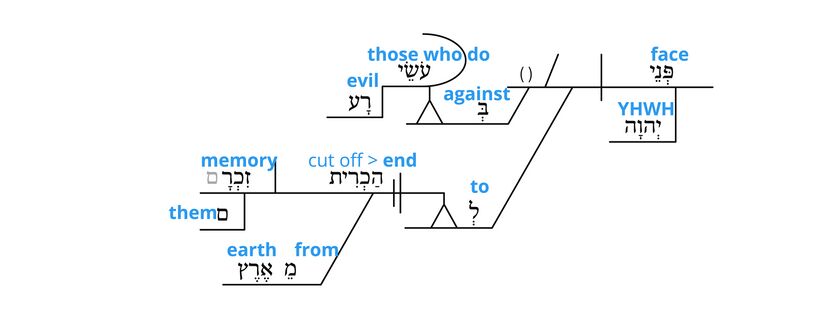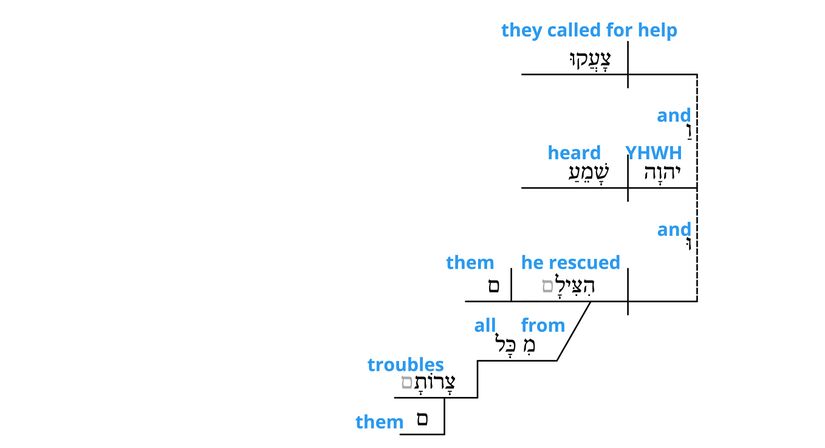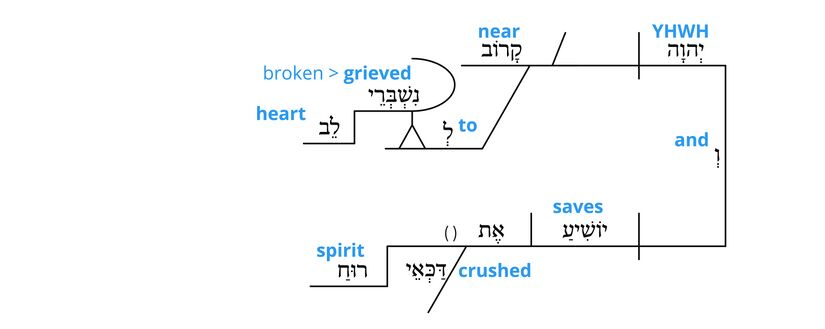Psalm 34 Grammar: Difference between revisions
From Psalms: Layer by Layer
Amanda.Jarus (talk | contribs) |
Amanda.Jarus (talk | contribs) No edit summary |
||
| Line 12: | Line 12: | ||
==v. 4== | ==v. 4== | ||
[[File: Ps 34 - Grammatical v.4.jpg|class=img-fluid|825px]] | [[File: Ps 34 - Grammatical v.4.jpg|class=img-fluid|825px]] | ||
* The phrase '''לַיהוָה''' could be interpreted a few ways: | |||
** Option 1: The ''lamed'' marks the direct object (cf. LXX: μεγαλύνατε τὸν κύριον). | |||
** Option 2 (preferred): Jenni groups this use of ''lamed'' with other times ''lamed'' is used with verbs of praise (ידה שיר זמר etc.) to indicate the one who is praised.<ref>Jenni 2000, 146; cf. Hupfeld 1868, 251.</ref> With verbs of praise, it’s not uncommon for the one who is praised to be either the direct object or the object of a lamed PP. Compare, for example, Ps. 111:1 (אוֹדֶה יְהוָה) and Ps. 118:1 (הוֹדוּ לַיהוָה). A good analogy to גדּל is the verb כבּד. For the verb כבד in the D stem, the person honored is always the direct object, except in Ps. 86:9 (וִֽיכַבְּד֣וּ לִשְׁמֶֽךָ). In the very same psalm we also find וַאֲכַבְּדָ֖ה שִׁמְךָ֣ (v. 12). | |||
** Option 3: the phrase גדל ל is short for הבו גדל ל (which occurs in Deut 32:3; cf. Targum Pss. הבו רבותא קדם ייי עימי).<ref>Cf. Hupfeld 1868, 251.</ref> | |||
==v. 5== | ==v. 5== | ||
[[File: Ps 34 - Grammatical v.5.jpg|class=img-fluid|825px]] | [[File: Ps 34 - Grammatical v.5.jpg|class=img-fluid|825px]] | ||
==v. 6== | ==v. 6== | ||
[[File: Ps 34 - Grammatical v.6.jpg|class=img-fluid|825px]] | [[File: Ps 34 - Grammatical v.6.jpg|class=img-fluid|825px]] | ||
* There is a textual problem in this verse. For a detailed discussion, see [[The Text of Ps. 34:6]]. In short, the MT translates "They looked... and were lightened: and their faces..." (KJV) (הִבִּיטוּ אֵלָיו וְנָהָרוּ).<ref>The verbs "they looked... and were lightened" are often translated in a timeless sense (NIV, NLT, NET, GNT, JPS85). However, if the MT is correct, then the ''qatal'' forms plus the immediately surrounding past-tense context (vv. 5, 7) would strongly suggest reading these verbs as past tense: "They looked unto him, and were lightened" (KJV).</ref> By contrast, some modern translations (RSV, NRSV, CEV, NJB, NEB, GNB) have imperatives in the a-line ("look to him and be radiant!") and a 2mp suffix in the b-line ("your faces"). The latter option has the support of most of the ancient versions<ref>LXX, Aquila, Peshitta, Jerome.</ref> and fits better within the syntactic context of v. 6 (jussive in the b-line), the wider semantic context of the first half of the psalm (vv. 2-11), and the psalm's historical background (v. 1; cf. 1 Sam. 21). | |||
==v. 7== | ==v. 7== | ||
[[File: Ps 34 - Grammatical v.7.jpg|class=img-fluid|825px]] | [[File: Ps 34 - Grammatical v.7.jpg|class=img-fluid|825px]] | ||
* זה | * There are three options for interpreting the phrase '''זֶה עָנִי קָרָא ''': | ||
* | ** Option 1 (preferred): זה as subject and קרא is a relative clause; so Peshitta: ܗܢܘ ܡܣܟܢܐ ܕܩܪܝܗܝ ("this is a poor man who cried out to him").<ref> Cf. Baethgen (1904) “Hier ist ein Dulder, welcher rief.” “זה עני ist nich ‘dieser Elende ̓, sondern das Pronomen steht deiktisch, und קרא ist mit dem Syrer als Relativsatz aufzufassen” (so NEB, JPS85, ELB, GNB, ZÜR, GWT; so Goldingay 2006, 475).</ref> Cf. Ps. 118:24. | ||
* | ** Option 2: זה as adjectival modifier (“this poor one”); so most English translations. See JM 143i - “In some very rare cases זה seems to be used adjectivally before the noun” (e.g., Ex. 32:1; 1 Sam. 21:12; Ct. 7:8; Isa. 23:13; Ps. 34:7; 104:25; 118:20). | ||
** Options 3: Revocalize to עֳנִי (“affliction”). “Similarly, in Ps. xxxiv 7, the phrase זה עני ought to be understood as 'the poor man', lit., 'he possessing affliction or poverty' (reading עֳני for MT עָני).”<ref> (Allegro 1955, pp. 309–12)</ref> (cf. Waltke and O'Connor 19.5). | |||
==v. 8== | ==v. 8== | ||
[[File: Ps 34 - Grammatical v.8.jpg|class=img-fluid|825px]] | [[File: Ps 34 - Grammatical v.8.jpg|class=img-fluid|825px]] | ||
* Here '''סָבִיב''' is taken as preposition (so BDB and DCH); see BDB on the construction סָבִיב לְ׳. | |||
==v. 9== | ==v. 9== | ||
[[File: Ps 34 - Grammatical v.9.jpg|class=img-fluid|825px]] | [[File: Ps 34 - Grammatical v.9.jpg|class=img-fluid|825px]] | ||
* The '''כִּי''' clause belongs with both verbs. cf. Prov. 31:18 - טָ֭עֲמָה כִּי־טֹ֣וב סַחְרָ֑הּ; Gen. 1:4 - וַיַּ֧רְא אֱלֹהִ֛ים אֶת־הָאֹ֖ור כִּי־טֹ֑וב | |||
==v. 10== | ==v. 10== | ||
[[File: Ps 34 - Grammatical v.10.jpg|class=img-fluid|825px]] | [[File: Ps 34 - Grammatical v.10.jpg|class=img-fluid|825px]] | ||
| Line 34: | Line 42: | ||
==v. 13== | ==v. 13== | ||
[[File: Ps 34 - Grammatical v.13.jpg|class=img-fluid|825px]] | [[File: Ps 34 - Grammatical v.13.jpg|class=img-fluid|825px]] | ||
* The LXX (cf. 1 Pet. 3:10) apparently reads אֹהֵ֥ב יָ֝מִ֗ים לִרְא֥וֹת טֽוֹב as a single clause: ἀγαπῶν ἡμέρας ἰδεῖν ἀγαθάς ("coveting to see good days"). Cf. Peshitta: ܘܪܚܡ ܝܘܡ̈ܬܐ ܛܒ̈ܐ ܠܡܚܙܐ܂; Jerome: diligens dies videre bonos. But this interpretation involves grammatical discord: טוֹב (singular) modifies יָמִים (plural). It also requires a strained interpretation of the word order and prosodic structure. | * There are several possible interpretations of the word '''לִרְאוֹת''' in this verse: | ||
* | ** Option 1: The LXX (cf. 1 Pet. 3:10) apparently reads אֹהֵ֥ב יָ֝מִ֗ים לִרְא֥וֹת טֽוֹב as a single clause: ἀγαπῶν ἡμέρας ἰδεῖν ἀγαθάς ("coveting to see good days"). Cf. Peshitta: ܘܪܚܡ ܝܘܡ̈ܬܐ ܛܒ̈ܐ ܠܡܚܙܐ܂; Jerome: ''diligens dies videre bonos''. But this interpretation involves grammatical discord: טוֹב (singular) modifies יָמִים (plural). It also requires a strained interpretation of the word order and prosodic structure. | ||
* | ** Option 2: לִרְאוֹת as purpose clause. The phrase אהב ימים corresponds to חפץ חיּים, "so that consequently לראות is a definition of the purpose."<ref>Delitzsch.</ref> "...loves many days, that he may see good?" (ESV) >> "...desires a long life to enjoy all good things" (NEB). | ||
** Option 3 (preferred): לִרְאוֹת as complement of an elided אהב: "who loves days, [who loves] to see good" (cf. Isa. 56:10; Jer. 14:10; Hos. 10:11; 12:8). So Jenni. | |||
==v. 14== | ==v. 14== | ||
| Line 58: | Line 67: | ||
==v. 21== | ==v. 21== | ||
[[File: Psalm 034 - grammar v. 21.jpg|class=img-fluid|825px]] | [[File: Psalm 034 - grammar v. 21.jpg|class=img-fluid|825px]] | ||
* Most translations read v. 21 as an independent clause: "he protects all his bones" (Peshitta [ܘܢܛܪ], Jerome [custodit], NIV, NLT, ESV, NET, NEB, LUT, NGÜ, ELB, EÜ, GNB, ZÜR). But שמר is a participle, and a participle (unlike a finite verb) does not usually function as the main predication of a clause without an explicit subject. (The difficulty of the participle without an explicit subject is probably what led the LXX to redivide the lines: καὶ ἐκ πασῶν αὐτῶν ῥύσεται αὐτούς. // κύριος φυλάσσει πάντα τὰ ὀστᾶ αὐτῶν. Similarly, one Kennicott ms and one De Rossi ms read שומר יהוה.) Therefore, שמר is probably in apposition to יהוה at the end of the previous clause: "...the Lord // the one who protects all his bones" (cf. JPS85: "the Lord will save him from them all, Keeping all his bones intact..."). This interpretation of the grammar is supported by the fact that v. 20 contrasts with v. 22 (the effects of רעה on the righteous and the wicked respectively). If v. 21 is not grammatically subordinated to v. 20, then the contrast is obscured. | * Most translations read v. 21 as an independent clause: "he protects all his bones" (Peshitta [ܘܢܛܪ], Jerome [custodit], NIV, NLT, ESV, NET, NEB, LUT, NGÜ, ELB, EÜ, GNB, ZÜR). But שמר is a participle, and a participle (unlike a finite verb) does not usually function as the main predication of a clause without an explicit subject. (The difficulty of the participle without an explicit subject is probably what led the LXX to redivide the lines: καὶ ἐκ πασῶν αὐτῶν ῥύσεται αὐτούς. // κύριος φυλάσσει πάντα τὰ ὀστᾶ αὐτῶν. Similarly, one Kennicott ms and one De Rossi ms read שומר יהוה.) Therefore, שמר is probably in apposition to יהוה at the end of the previous clause: "...the Lord // the one who protects all his bones" (cf. JPS85: "the Lord will save him from them all, Keeping all his bones intact..."). | ||
:This interpretation of the grammar is supported by the fact that v. 20 contrasts with v. 22 (the effects of רעה on the righteous and the wicked respectively). If v. 21 is not grammatically subordinated to v. 20, then the contrast is obscured. | |||
:On the other hand, "the personal pronoun which would be expected as the subject of a participial clause is frequently omitted, or at least... the pronoun of the 3rd person הוא."<ref>GKC 116s; cf. Ps. 33:5; Job 12:17, 19-24.</ref> | |||
==v. 22== | ==v. 22== | ||
| Line 71: | Line 81: | ||
:Delitzsch, Franz. ''[https://archive.org/details/biblicalcommenta188301deli/page/448/mode/2up?view=theater. Biblical Commentary on the Psalms: Vol. 1]''. Translated by Eaton David. Vol. 1. New York: Funk and Wagnalls, 1883. | :Delitzsch, Franz. ''[https://archive.org/details/biblicalcommenta188301deli/page/448/mode/2up?view=theater. Biblical Commentary on the Psalms: Vol. 1]''. Translated by Eaton David. Vol. 1. New York: Funk and Wagnalls, 1883. | ||
:Goldingay, John. 2006. ''Psalms: Psalms 1–41''. Vol. 1. BCOT. Grand Rapids: Baker Academic, 2006. | :Goldingay, John. 2006. ''Psalms: Psalms 1–41''. Vol. 1. BCOT. Grand Rapids: Baker Academic, 2006. | ||
:Hupfeld, Hermann. 1868. ''Die Psalmen''. Vol. 2. Gotha: Friedrich Andreas Perthes. | |||
:Jenni, Ernst. ''Die Hebräischen Präpositionen Band 3: Die Präposition Lamed''. Stuttgart: Verlag W. Kohlhammer, 2000. | :Jenni, Ernst. ''Die Hebräischen Präpositionen Band 3: Die Präposition Lamed''. Stuttgart: Verlag W. Kohlhammer, 2000. | ||
=References= | =References= | ||
Revision as of 12:28, 19 March 2025
Grammatical Diagram
The grammar layer visually represents the grammar and syntax of each clause. It also displays alternative interpretations of the grammar. (For more information, click "Grammar Legend" below.)
v. 1
v. 2
v. 3
v. 4
- The phrase לַיהוָה could be interpreted a few ways:
- Option 1: The lamed marks the direct object (cf. LXX: μεγαλύνατε τὸν κύριον).
- Option 2 (preferred): Jenni groups this use of lamed with other times lamed is used with verbs of praise (ידה שיר זמר etc.) to indicate the one who is praised.[1] With verbs of praise, it’s not uncommon for the one who is praised to be either the direct object or the object of a lamed PP. Compare, for example, Ps. 111:1 (אוֹדֶה יְהוָה) and Ps. 118:1 (הוֹדוּ לַיהוָה). A good analogy to גדּל is the verb כבּד. For the verb כבד in the D stem, the person honored is always the direct object, except in Ps. 86:9 (וִֽיכַבְּד֣וּ לִשְׁמֶֽךָ). In the very same psalm we also find וַאֲכַבְּדָ֖ה שִׁמְךָ֣ (v. 12).
- Option 3: the phrase גדל ל is short for הבו גדל ל (which occurs in Deut 32:3; cf. Targum Pss. הבו רבותא קדם ייי עימי).[2]
v. 5
v. 6
- There is a textual problem in this verse. For a detailed discussion, see The Text of Ps. 34:6. In short, the MT translates "They looked... and were lightened: and their faces..." (KJV) (הִבִּיטוּ אֵלָיו וְנָהָרוּ).[3] By contrast, some modern translations (RSV, NRSV, CEV, NJB, NEB, GNB) have imperatives in the a-line ("look to him and be radiant!") and a 2mp suffix in the b-line ("your faces"). The latter option has the support of most of the ancient versions[4] and fits better within the syntactic context of v. 6 (jussive in the b-line), the wider semantic context of the first half of the psalm (vv. 2-11), and the psalm's historical background (v. 1; cf. 1 Sam. 21).
v. 7
- There are three options for interpreting the phrase זֶה עָנִי קָרָא :
- Option 1 (preferred): זה as subject and קרא is a relative clause; so Peshitta: ܗܢܘ ܡܣܟܢܐ ܕܩܪܝܗܝ ("this is a poor man who cried out to him").[5] Cf. Ps. 118:24.
- Option 2: זה as adjectival modifier (“this poor one”); so most English translations. See JM 143i - “In some very rare cases זה seems to be used adjectivally before the noun” (e.g., Ex. 32:1; 1 Sam. 21:12; Ct. 7:8; Isa. 23:13; Ps. 34:7; 104:25; 118:20).
- Options 3: Revocalize to עֳנִי (“affliction”). “Similarly, in Ps. xxxiv 7, the phrase זה עני ought to be understood as 'the poor man', lit., 'he possessing affliction or poverty' (reading עֳני for MT עָני).”[6] (cf. Waltke and O'Connor 19.5).
v. 8
- Here סָבִיב is taken as preposition (so BDB and DCH); see BDB on the construction סָבִיב לְ׳.
v. 9
- The כִּי clause belongs with both verbs. cf. Prov. 31:18 - טָ֭עֲמָה כִּי־טֹ֣וב סַחְרָ֑הּ; Gen. 1:4 - וַיַּ֧רְא אֱלֹהִ֛ים אֶת־הָאֹ֖ור כִּי־טֹ֑וב
v. 10
v. 11
v. 12
v. 13
- There are several possible interpretations of the word לִרְאוֹת in this verse:
- Option 1: The LXX (cf. 1 Pet. 3:10) apparently reads אֹהֵ֥ב יָ֝מִ֗ים לִרְא֥וֹת טֽוֹב as a single clause: ἀγαπῶν ἡμέρας ἰδεῖν ἀγαθάς ("coveting to see good days"). Cf. Peshitta: ܘܪܚܡ ܝܘܡ̈ܬܐ ܛܒ̈ܐ ܠܡܚܙܐ܂; Jerome: diligens dies videre bonos. But this interpretation involves grammatical discord: טוֹב (singular) modifies יָמִים (plural). It also requires a strained interpretation of the word order and prosodic structure.
- Option 2: לִרְאוֹת as purpose clause. The phrase אהב ימים corresponds to חפץ חיּים, "so that consequently לראות is a definition of the purpose."[7] "...loves many days, that he may see good?" (ESV) >> "...desires a long life to enjoy all good things" (NEB).
- Option 3 (preferred): לִרְאוֹת as complement of an elided אהב: "who loves days, [who loves] to see good" (cf. Isa. 56:10; Jer. 14:10; Hos. 10:11; 12:8). So Jenni.
v. 14
v. 15
v. 16
v. 17
v. 18
v. 19
v. 20
v. 21
- Most translations read v. 21 as an independent clause: "he protects all his bones" (Peshitta [ܘܢܛܪ], Jerome [custodit], NIV, NLT, ESV, NET, NEB, LUT, NGÜ, ELB, EÜ, GNB, ZÜR). But שמר is a participle, and a participle (unlike a finite verb) does not usually function as the main predication of a clause without an explicit subject. (The difficulty of the participle without an explicit subject is probably what led the LXX to redivide the lines: καὶ ἐκ πασῶν αὐτῶν ῥύσεται αὐτούς. // κύριος φυλάσσει πάντα τὰ ὀστᾶ αὐτῶν. Similarly, one Kennicott ms and one De Rossi ms read שומר יהוה.) Therefore, שמר is probably in apposition to יהוה at the end of the previous clause: "...the Lord // the one who protects all his bones" (cf. JPS85: "the Lord will save him from them all, Keeping all his bones intact...").
- This interpretation of the grammar is supported by the fact that v. 20 contrasts with v. 22 (the effects of רעה on the righteous and the wicked respectively). If v. 21 is not grammatically subordinated to v. 20, then the contrast is obscured.
- On the other hand, "the personal pronoun which would be expected as the subject of a participial clause is frequently omitted, or at least... the pronoun of the 3rd person הוא."[8]
v. 22
v. 23
Bibliography
- Allegro, John Marco. 1955.“Uses of the Semitic Demonstrative Element Z in Hebrew.” Vetus Testamentum, vol. 5, no. 3 July: pp. 309–12.
- Baethgen, Friedrich. 1904. Die Psalmen. Göttingen: Vandenhoeck und Ruprecht.
- Delitzsch, Franz. Biblical Commentary on the Psalms: Vol. 1. Translated by Eaton David. Vol. 1. New York: Funk and Wagnalls, 1883.
- Goldingay, John. 2006. Psalms: Psalms 1–41. Vol. 1. BCOT. Grand Rapids: Baker Academic, 2006.
- Hupfeld, Hermann. 1868. Die Psalmen. Vol. 2. Gotha: Friedrich Andreas Perthes.
- Jenni, Ernst. Die Hebräischen Präpositionen Band 3: Die Präposition Lamed. Stuttgart: Verlag W. Kohlhammer, 2000.
References
- ↑ Jenni 2000, 146; cf. Hupfeld 1868, 251.
- ↑ Cf. Hupfeld 1868, 251.
- ↑ The verbs "they looked... and were lightened" are often translated in a timeless sense (NIV, NLT, NET, GNT, JPS85). However, if the MT is correct, then the qatal forms plus the immediately surrounding past-tense context (vv. 5, 7) would strongly suggest reading these verbs as past tense: "They looked unto him, and were lightened" (KJV).
- ↑ LXX, Aquila, Peshitta, Jerome.
- ↑ Cf. Baethgen (1904) “Hier ist ein Dulder, welcher rief.” “זה עני ist nich ‘dieser Elende ̓, sondern das Pronomen steht deiktisch, und קרא ist mit dem Syrer als Relativsatz aufzufassen” (so NEB, JPS85, ELB, GNB, ZÜR, GWT; so Goldingay 2006, 475).
- ↑ (Allegro 1955, pp. 309–12)
- ↑ Delitzsch.
- ↑ GKC 116s; cf. Ps. 33:5; Job 12:17, 19-24.




















